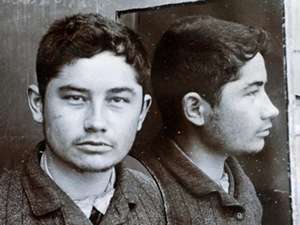Detailed examination of the archives of the recently closed Reading Prison has revealed new insights into Oscar Wilde's incarceration there in the 1890s.
The findings, by Professor Peter Stoneley, University of Reading, shed new light on the men who helped Wilde through his imprisonment and inspired The Ballad of Reading Gaol, but who have until now been largely ignored.
The discoveries form part of a new exhibition, 'Oscar Wilde and Reading Gaol', which opens at the Berkshire Record Office next week. Today (16 October 2014) marks the 160th anniversary of Wilde's birth.
Professor Stoneley has been working closely with staff at the Berkshire Record Office to uncover details of the prison regime in Wilde's time. Among the findings is a photograph of a fellow convict to whom Wilde was attracted, and poignant details of the Victorian prison system which Wilde went on to campaign against and write about.
Professor Stoneley said: "The well-known legend of Reading Gaol has, until now, focused almost exclusively on the tragedy of Oscar Wilde. The story of Wilde's homosexual relationship with Lord Alfred Douglas which led to a criminal conviction, imprisonment and untimely death is a compelling series of events.
"But Wilde himself urged us to look beyond this story to 'the others', the men, women and children who were in prison alongside him. It was seeing and understanding their suffering that helped him to come to terms with his own, and it made him an extraordinarily powerful advocate for prison reform. Yet until now, no genuine effort has been made to understand the circumstances of these men.
"This research traces, as far as the records allow, the lives of Wilde's fellow prisoners. Learning about these people deepens our understanding of Wilde and the period in which he lived. Above all, it reminds us of the most attractive aspects of Wilde's own character – his generosity of spirit, and his openness to the most despised members of his society."
This, the first analytic study of Wilde's fellow prisoners, reveals a number of insights:
- Homosexuality: As far as records show, there were no other prisoners in Reading at the same time as Wilde convicted for homosexual acts. However, Wilde's crime did not make him exceptional. In the years immediately prior to his own incarceration, in 1893 a 27-year-old sailor and a 32-year-old labourer were imprisoned in Reading for 'indecency with a male' and in 1894 a 19-year-old labourer was imprisoned for buggery
- Health: Wilde's failing health is chronicled from an 1896 enquiry, which concluded that 'prison life must of course be more irksome and severe for a prisoner of his education and antecedent than it would be to an ordinary one'
- Hanging: Records detail the execution of Trooper Charles Wooldridge, the soldier whose death forms the subject of The Ballad of Reading Gaol. The prison doctor noted, before the sentence was carried out, that Wooldridge had a 'rather long' neck.
- Children: Wilde wrote of his experience of hearing child prisoners crying. In the two years immediately preceding his arrival, 22 children were imprisoned in Reading, including a seven-year-old, sentenced to one month's imprisonment and two birchings for setting fire to a hay rick, an 11-year-old who stole a paintbrush, and a 10-year-old who killed a duck.
- Class: Wilde was almost certainly the only middle-class, university-educated person to be imprisoned in Reading in the period. The vast majority of his fellow inmates were labourers
- Crime: The most frequent crime was petty theft. Typical objects stolen include rabbits, shirts on a line, pipes and tobacco, and boots. The second most frequent crime was being drunk and disorderly
- Rehabilitation: Despite its harsh conditions, Reading Prison, like most Victorian prisons, effectively had a 'revolving door' for repeat petty offenders
That Wilde survived his prison years at all he put down to his fellow inmates. He told a friend that for the first six months of his sentence he had wanted to die, but that seeing and communicating with other prisoners had saved him. He even came to describe some of these men as his 'pals'.
Wilde wrote to a friend: "There are many good nice fellows here. I have seven or eight friends: they are capital chaps: of course we can't speak to each other, except a word now and then at exercise, but we are great friends."
But who were these 'capital chaps', and how had they helped him?
The soldiers: In particular, Wilde liked Arthur Cruttenden, a soldier in his late twenties who had been discharged 'with ignominy' for drunkenness. Wilde was not attracted to Cruttenden, but mentions in a letter Harry Elvin, imprisoned for 'offensive behaviour' on the Strand in London, as 'a very handsome young soldier'.
The mugshots: Wilde mentioned a 'little dark-eyed chap' in a letter – probably Henry Bushnell, a labourer and thief so prolific, or inept, that he was incarcerated 21 times between 1892 and 1911. But his inability to stay out of prison has left a fascinating legacy. In the 1890s most inmates were not routinely photographed, but as a repeat offender, Bushnell was often photographed on admission. These seven mugshots of Bushnell are the only known photographs in existence of any of the working-class young men in whom Wilde took an interest through his life.
The research was carried out in the Prison Archive of the Berkshire Record Office in Reading.
Mark Stevens, senior archivist at the Record Office, said: "Reading Prison is one of literature's most iconic buildings, and the archive is full of hidden stories from Victorian England."
Professor Stoneley's full findings are due to be published later this month in the Journal of Victorian Culture.
Provided by University of Reading





















